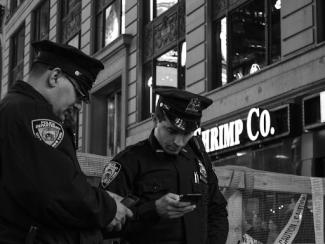
In 2012, the NYPD’s gang unit doubled in size ahead of a new operation: Operation Crew Cut. But it didn’t just take place on the streets. Using fake social media profiles, these cops manipulated their way into the digital world of Black youth as young as 12.
Community members wanted an end to violence. But not like this.
Stop and Frisk hurt the mental and physical health of Black and Latinx youth, causing stress and fear, and was eventually banned by the courts in 2013. But now, there's a new issue: police are resorting to virtual stop-and-frisk tactics, using social media to watch people in a way that's similar to Stop and Frisk and resulting in historic gang raids.
2014’s raid on Harlem’s Grant and Manhattanville housing communities resulted in 103 arrests. In another raid in 2016, nearly 700 officers and agents arrested 120 people.
Instead, young Black men in New York were met with anti-Black policing tactics. NYPD made fake accounts or bought special tools to watch people on social media as a way to access private information without breaking privacy laws.
Columbia University also openly admitted to a “long-term collaboration” with the NYPD, claiming to want its students and faculty to feel safe.
Perhaps if the same desire to keep Ivy League undergraduates safe applied to the children in Harlem’s middle and high schools, the raids and surveillance wouldn’t have happened.
It may be too late to stop Operation Crew Cut. But this shows why we need new measures to control how social media companies work and to protect Black students from unfair treatment by the police on the internet until policing itself is dismantled.